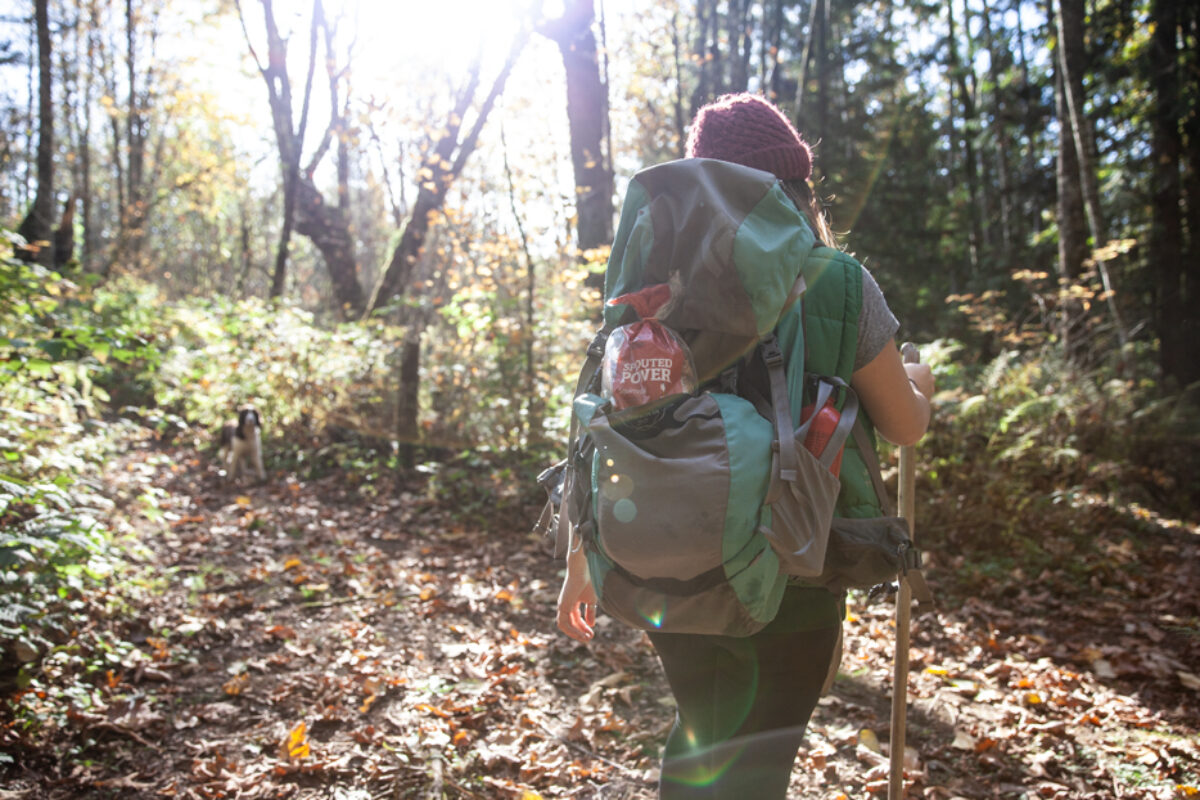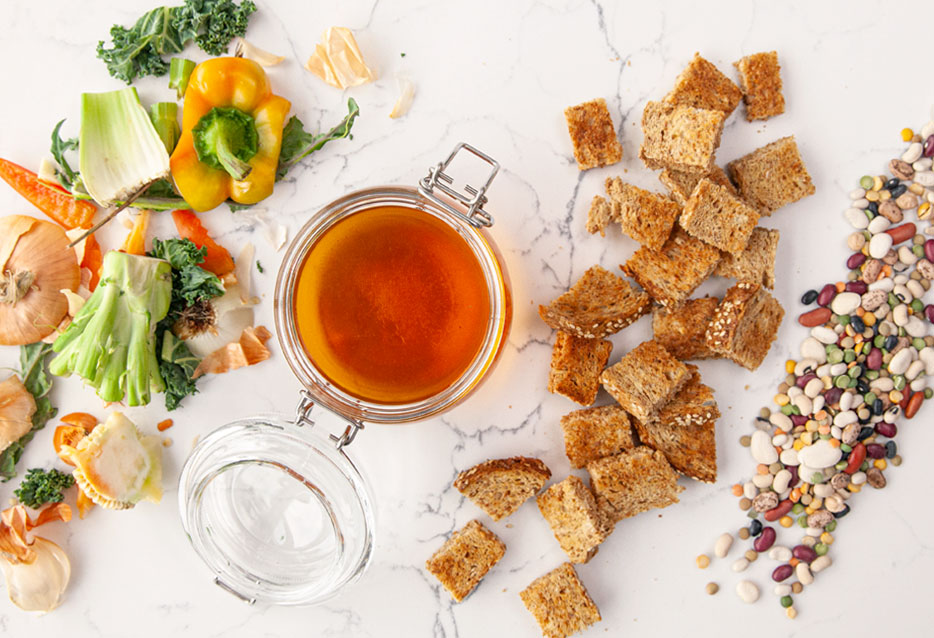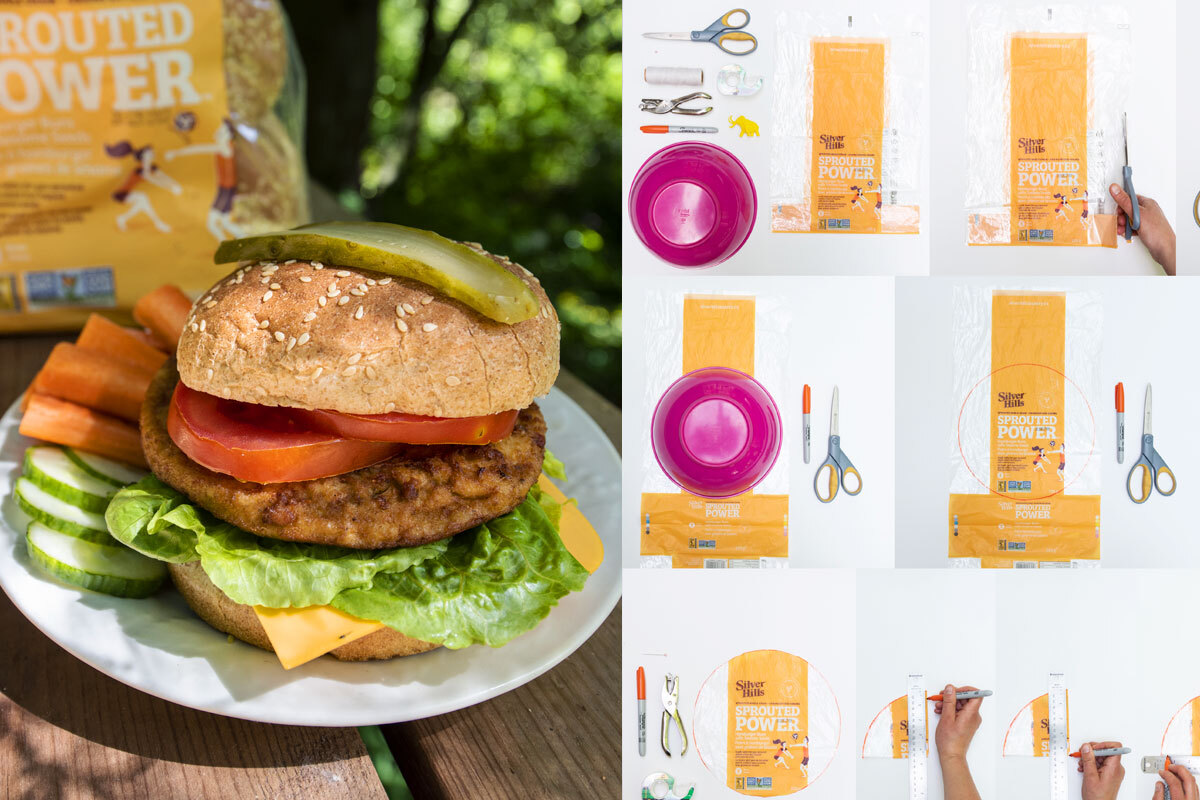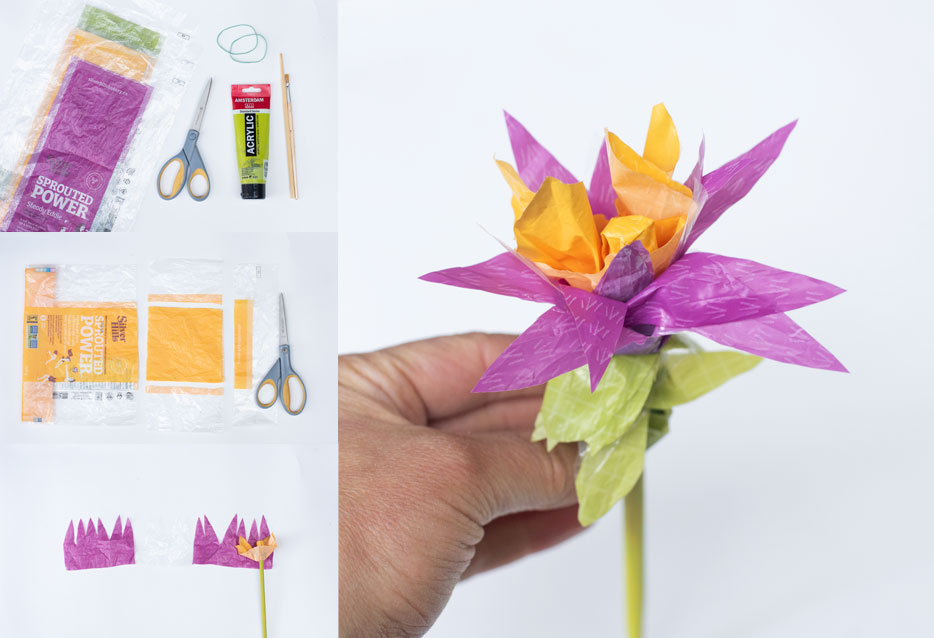Article Our Sustainability Journey
How we're making Silver Hills Bakery's footprint on the planet a little lighter every day
April 18, 2022

Both are about making a commitment to doing better over time, to making the best choices we can with the resources and knowledge we have today, and to learning as much as we can along the way.
And both are about striving to do our part to take care of ourselves—one meal, and one choice at a time—so we can take care of the people we love.
At Silver Hills Sprouted Bakery, sustainability milestones are markers to show us how far we’ve come. And they’re an invitation to take our next step, to make our next small improvement, and to seek our next opportunity to do our part to take care of Mother Earth.
As our sustainability journey has no end, this article isn’t one that’s meant to have a pretty bow or neat conclusion. Rather we invite you into the middle of our story as it’s being written.
Read on as we share where we’ve been—and what we’re working on right now—to make our footprint on the planet a little lighter every day.
In this article:
There’s no use beating around the bush—our bread is packaged in plastic. And single-use plastic is something we can all agree we should be using less of. Which is why at Silver Hills Bakery we’re always looking for ways to use less plastic in our packaging.
On the surface, getting out of the plastic packaging game might seem simple—but it isn’t as straightforward as “just don’t wrap bread in plastic.” Unlike your neighbourhood artisan baker who only bakes whole loaves they can sell that day to local shoppers to enjoy right away, our sliced bread has to stay fresh for longer. And the packaging we use has a big impact on freshness.
Especially because we don’t use artificial preservatives in our sprouted breads, buns, bagels, or tortillas.
Families expect our bread to last for a week’s worth of toasts and sandwiches after they bring it home from the store. Our packaging has to help keep our bread fresh for as long as possible. And in all storage and shipping conditions.
Freezing bread lengthens its shelf life—and that applies at the scale of your home as much as it does in getting our product from our Abbotsford, British Columbia bakery to stores and homes across North America.
When we ship beyond the Metro Vancouver area, we ship our bread frozen to ensure it’s as fresh as can be by the time you find it in the bakery aisle. So our packaging needs to keep our bread at peak fresh-from-the-oven quality whether it’s shipped fresh to local stores or shipped frozen all the way to Nova Scotia and Florida.
The brown paper bag your neighbourhood baker slides over a still-warm artisan loaf as they hand it to you works great when you live around the corner and plan to slice and serve it with tonight’s dinner. But it won’t keep sliced Squirrelly Bread soft for Monday’s sandwich—and it sure won’t hold up to a freezer truck trip from Abbotsford to Toronto.
That’s a long way of saying our packaging needs to strike a balance between being as environmentally responsible as possible without compromising freshness. And it’s a challenge we’ve been working on for years.
Compostable Plastic: The Green-Sounding Swap That Wasn’t
From 2015 to 2016, we took our first big crack at the single-use plastic packaging challenge by switching to compostable bio-plastic bags. Our heart was in the right place. But we learned that our best intentions were at odds with the reality of this too-good-to-be-true swap.
The problem? Only a few municipalities in all of North America are capable of properly composting bio-plastic. Plant-based plastics are technically compostable, but they need specific conditions (high heat and oxygen) to break down. And in cities where composting conditions like that don’t exist, bio-plastic has to be sorted out and ends up in the landfill1.
To make matters worse, bio-plastics also can’t be recycled with other soft plastics—and when they can’t be sorted out, they can doom otherwise recyclable plastics to the landfill, too. And if bio-plastic bread bags can’t be composted, can’t be recycled, and end up in the landfill as waste, using them is adding problems instead of solving the one we set out to fix.
Until enough facilities exist to compost bio-plastics properly, this green-sounding swap isn’t a planet-friendly answer to our packaging (yet!)
If Zero Isn’t Possible, Can We Use Less?
After our disappointing year with bio-plastic, Silver Hills Bakery switched back to recyclable low-density bags. But even though we take some comfort in learning that plastic packaging makes up only 1% of the carbon footprint of a loaf of bread2, we couldn’t help asking ourselves: if there isn’t a workable plastic-free alternative yet, could we use less plastic and still keep our bread fresh?
So in 2019, we reduced the thickness of our bags from 2 mm to 1.75 mm, using 12.5% less plastic with no impact on freshness. But we’re not stopping there! We’re currently testing 1.5 mm thick bags to help us reduce the amount of plastic used in our packaging by another 15%. That would equal a total reduction of 25%—all while keeping our same high standards for freshness and flavour!
On top of our effort to use as little plastic as possible, we do our best to minimize wasted packaging during production by recycling whatever we can’t use. And we’re testing recyclable bread tags, too. (Because every little bit matters. Even the tiny tab that keeps your bread wrapped up tight!)
And speaking of reducing waste…
There’s another side to the freshness coin when it comes to packaging. As much as we care deeply about making sure families have the best quality sprouted bread we can deliver—and making sure our bread arrives fresh and stays fresh is part of that experience—our packaging choices also help prevent food waste.
Food waste is a significant global environmental issue with its own carbon and sustainability impact.
Stale and spoiled bread get thrown out or composted. If we swap recyclable plastic for a packaging option that means more food is wasted, we risk trading one problematic choice for another.
In the meantime, we’re committed to doing the best we can for the planet and to keep searching and striving for better answers.
(Keep reading to learn more about food waste below!)
The Packaging Circle Includes You
There will always be more we can do to reduce our contribution to the single-use plastic problem. And you can help, too! Recycle your Silver Hills Bakery bags—separate them from your bin and drop off your soft plastic at your local recycling depot (or grocery store) that accepts Low Density Polyethylene (LDPE). Or find creative ways to reuse or repurpose them instead of tossing them in the trash. Check out these fun, kid-friendly STEM activities you can do with our bags:
The total carbon footprint of bread depends on how and where the ingredients are grown, how far they travel, how they’re processed, how the bread is produced, and how the finished loaves get from the bakery to your table.
Although we haven’t calculated the unique footprint of Silver Hills Bakery’s sprouted whole grain breads, an average loaf of bread has a carbon footprint of one kilogram CO2e, mainly from emissions on the farm3. Growing the wheat is the biggest part of this, but shipping, distribution, and storage are all factors as well.
Thankfully, these are all things we can make conscious choices about to help reduce the footprint of Silver Hills Bakery’s bread—starting with our ingredients.
Organic Ingredients…
Using organic ingredients is better for the environment because they don’t involve the use of artificial pesticides, fertilizers, or herbicides like glyphosate during the farming process. (And they’re non-GMO, too).
That’s why 78% of our products are certified organic! And why the few Silver Hills Sprouted Bakery products that aren’t certified organic (like fan-favourite Squirrelly Bread and The Big 16) are still made with 87% to 93% certified organic ingredients.
We also seek out and find any delicious excuse we can to use heritage and ancient grains whenever we can. Why? Ancient grains like Khorasan wheat and heritage varieties like Red Fife help support agrobiodiversity over mass monoculture (and all that goes with it).
…Grown as Close to Our Bakery as Possible
Our number one focus when it comes to sourcing ingredients is product quality—we choose certified organic grains whenever possible. Then we focus on sourcing these ingredients as close to our bakery as possible.
Canadian-grown grains make up 90% of the grain we use for our sprouted bread, most of which comes from western Canada (British Columbia, Alberta, and Saskatchewan). What we can’t find in Canada, we source from the United States—and we only search abroad for ingredients (like sesame seeds) that don’t grow domestically. (Or to keep up with the demand of our hungry fans when North American supply isn’t enough!).
Sourcing close to home means our ingredients travel a shorter distance, and fewer kilometres means less fuel (and a lower carbon footprint). In addition to this, we also buy our most-used ingredients in bulk. And that translates to fewer trips—and less shipment packaging waste, too.
Logistics and Shipping
Sourcing our ingredients as close to our bakery as possible helps before we get sprouting. But shipping our bread after it comes off the production line comes with even more opportunities to be environmentally responsible.
In western Canada where we ship our bread fresh, we pack our bread onto reusable stacking plastic trays so we can use every possible inch of space in the truck without squishing a slice.
When we ship outside of western Canada, we use recyclable corrugate boxes made with 73% recycled content recycled corrugate boxes—the smallest ones we can find so we can fit more boxes on every truck—and use less material and less fuel, too.
Because the fewer trucks—and fewer trips—we use to get our bread from our bakery to store shelves means a lower carbon footprint, we ship our products using the most fuel-efficient options we can. That means shipping full truck loads whenever possible. And when we can’t, our logistics team use their smarts and creativity to batch orders to our retailers, and work with our partners to max out the number of trays per truck or shipping container to make the most efficient use of space as our breads travel to customers across the continent.
To say food waste is a problem would be an understatement. Roughly one-third of food produced around the globe becomes food loss and waste, representing a missed opportunity for improved food security and an annual environmental, economic, and social cost of 2.6 trillion US dollars4.
Food waste is a multi-faceted problem—manufacturing food waste, retail/food service food waste, and household food waste* all contribute. And that means we all have a responsibility to help solve it.
You can’t slice bread without making crumbs—no matter how sharp your bread knife is or how sophisticated your slicer. But while zero food waste is an unrealistic goal, there’s always room to improve.
At Silver Hills, we do everything we can to reduce food waste in our bakery. In fact, our team includes a Continuous Improvement Manager whose role is dedicated to reducing waste throughout our production process. And that includes making the 5% of our production wasted every year even smaller.
Working with whole grains, seeds, and natural ingredients fresh from the farm means some waste in the sorting, cleaning, and quality control process before we even start sprouting. Seeds that don’t belong and inedible husks or hulls get sifted out and set aside.
And any seasoned baker accepts that even your most tried and true recipe can turn out a batch that isn’t quite up to scratch. Less-perfect loaves that don’t quite meet our high quality standards can be sold as seconds at our bakery store, The Sprouted Oven, or donated within our community. (Because a slightly uneven slice offers no less nutrition to families in need). But what about the waste not fit for people?
From mangled mis-cuts to mixer malfunctions, from once-in-a-century floods to surprise fire drills, a few over-baked or under-proofed loaves are inevitable. And the 5-second rule does not apply to loaves that leap off the line because they’re so excited to see you.
Instead of composting our crumbs and other unusable food waste from our bakery, we sell it to local farmers to be turned into animal feed in our community. Because those otherwise healthy whole grains deserve a second opportunity to nourish life.
*To learn how you can reduce the amount of food waste in your home—and save money while doing it— check out our guide to Healthy Eating on a Budget.
Keeping the mixers, ovens, and production lines running in a 24/6 commercial bakery takes a lot of energy. Fortunately, we are proud to run our production in British Columbia, where 98% of our electricity comes from clean, renewable sources like hydroelectricity5. But our easy access to clean electricity doesn’t give us an excuse to squander it.
When it comes to the energy part of our commitment to sustainability, two questions apply. How can we use less energy? And how can we be more efficient with the energy we use?
Our bakery lights are an obvious opportunity to do better in the strategic energy management project. Over the last two years, Silver Hills has been busy converting the lights in our bakery from incandescent and fluorescent bulbs to LEDs, and adding light sensors to low-traffic areas to save energy.
But lightbulbs are just one tiny thing on our to-do list. Across the bakery, we’re working on process improvements to help us make more bread with the same amount of electricity and natural gas. Our goal? To make every loaf as energy-efficient as possible. And we’re making progress!
In 2021 alone, we’ve decreased our electricity consumption by almost 10 percent, and our natural gas usage is down 15% per kilogram of production!
Now we’re looking at opportunities to recapture heat from our ovens to produce more bread with energy we already have. And we’re working on ways to sprout our grains with less water, too.
But we won’t stop there. Sustainability is a journey—not a destination. And we will keep looking for innovative and unexplored opportunities to do more with less.
At Silver Hills Bakery, we’ve been celebrating sprouted whole grains and plant-based foods since before it was cool. But we still get excited when the world’s top scientists state boldly, “Food is the single strongest lever to optimize human health and environmental sustainability on Earth.”6 And confirm that plant-based diets rich in whole grains are the healthiest, most cost-effective option compared to the benchmark diet in high-income countries such as Canada and the US7.
Eating plant-based (even a few meals or days a week) isn’t just good for you and your family’s health—and it’s good for the health of the planet! There is substantial scientific evidence that links plant-based (and plant-rich) diets with human health and environmental sustainability.
Overall, the body of peer-reviewed literature indicates that plant-based lifestyles are a win-win for both people and the planet6. The latest good news in 2022 suggests that a shift in dietary patterns with an increased consumption of whole, plant-based foods could reduce greenhouse gas emissions by up to 80%8.
How can choosing plant-based make that big an impact? Farming plant-based foods makes better use of land and water resources, making it more efficient and sustainable than animal agriculture. So there are plenty of reasons to add more plant-based meals to your weekly menu!
Silver Hills Sprouted Bakery breads, buns, bagels, and tortillas have always been—and always will be—completely plant-based and made from whole grain, whole food ingredients.
Adding our products to your grocery cart makes it deliciously easy to put plant-based meals on your family’s table. And our recipe centre is packed with fresh plant-based inspiration to make fast, healthy meals even easier, any day of the week. So you can feel good about what you’re eating, and the real impact you can make on the planet.
Going Forward: Sustainability is a Commitment
At Silver Hills Bakery, we believe in doing everything we can to foster healthy people, healthy families—and a healthy planet. We recognize that this mission has no end, and that there will always be new ways to reduce the size of our carbon footprint. That’s why our team at Silver Hills is committed to our sustainability journey every small step of the way.
As we continue to work on ways to improve the sustainability of everything we do at Silver Hills, we invite you to share any ideas you may have on how we can do better.
Get in touch through our contact page, or send us a DM on Facebook or Instagram. And scroll down to sign up for our newsletter to get updates and plant-based inspiration once a month.


